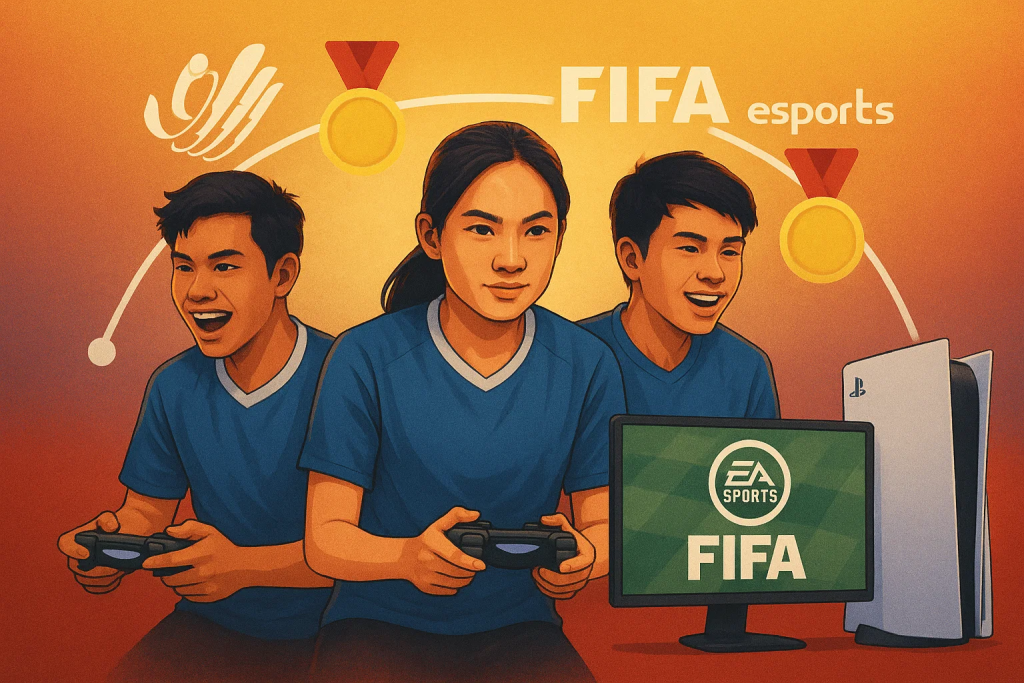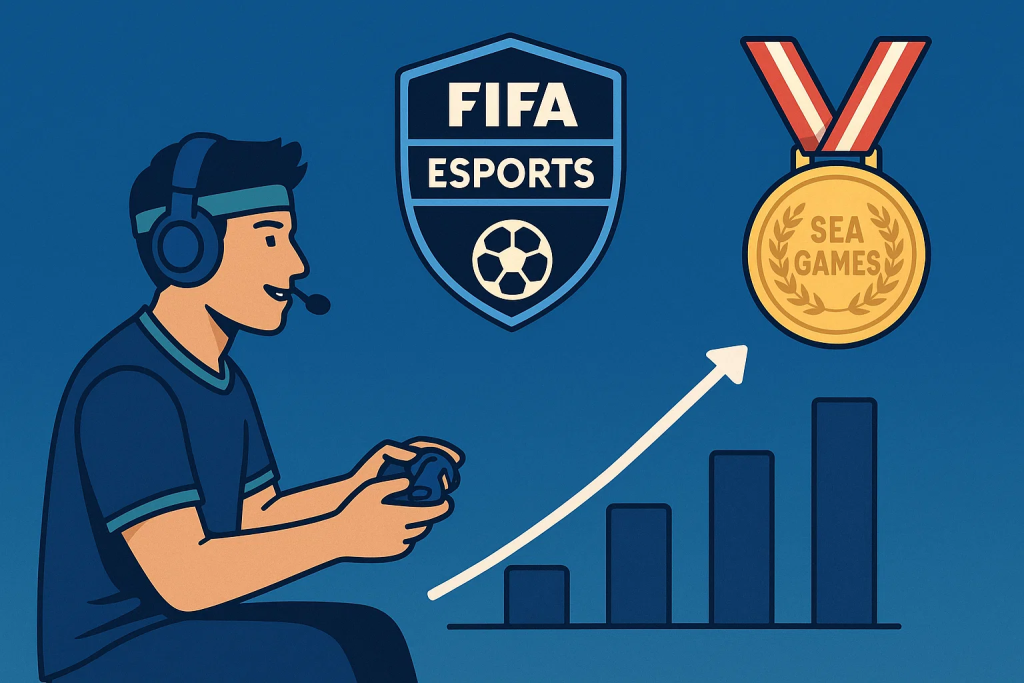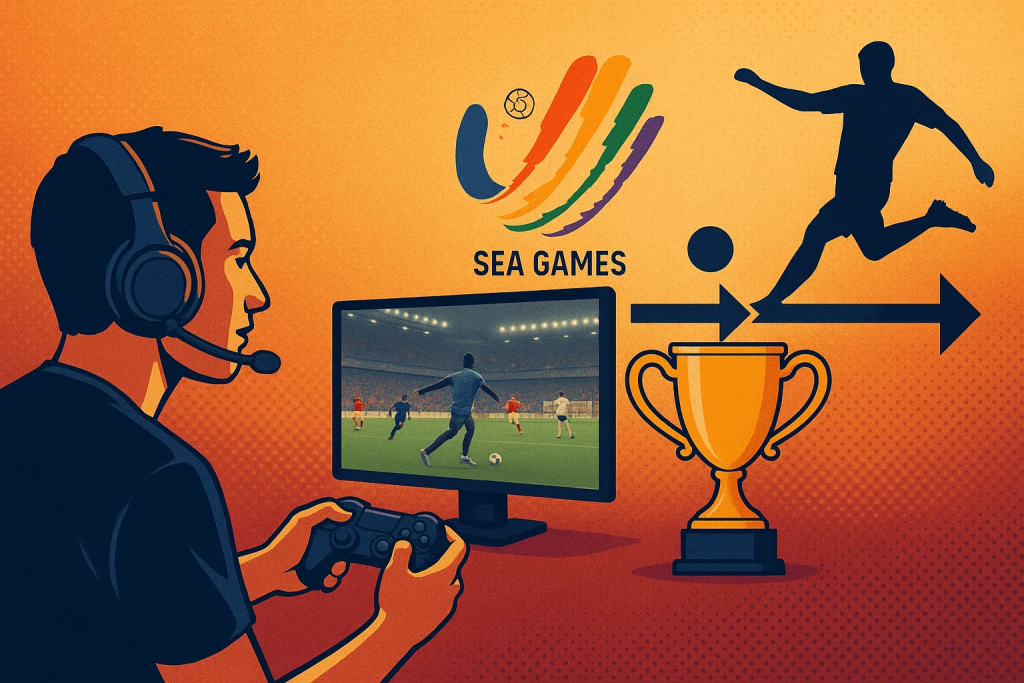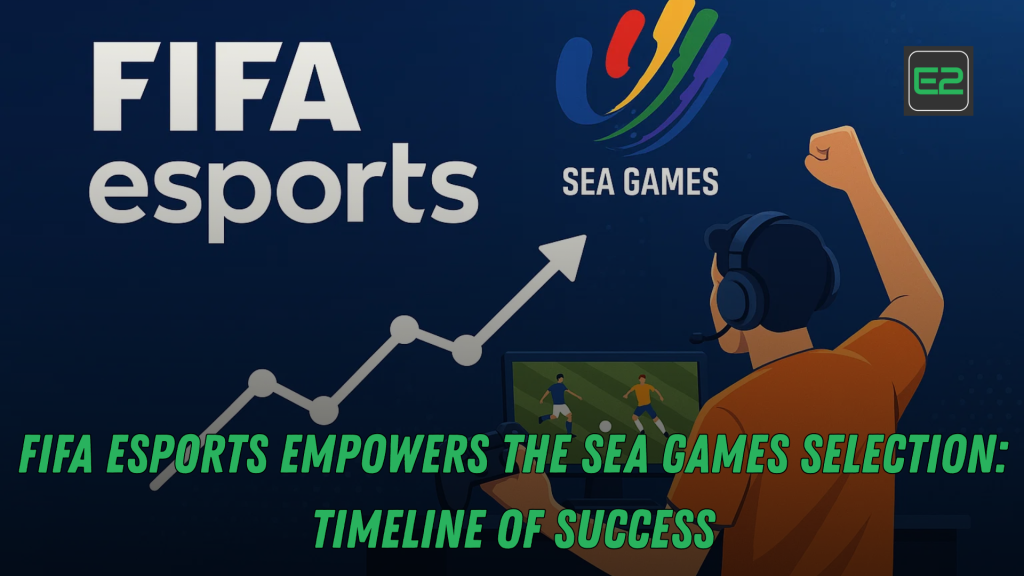Table of Contents
TL;DR
- FIFA-style football esports has become a proven medal pathway in Southeast Asia—notably when FIFA Online 4 (the PC-based title for Asia) debuted as a SEA Games medal event in Hanoi (2021 edition, played in 2022). Thailand took gold, Vietnam silver, Malaysia bronze.
- SEA Games 2019 introduced esports as medal events for the first time (no football title yet), institutionalizing the multi-sport stage for esports.
- By 2023 (Phnom Penh), esports grew further (VALORANT, MLBB, CrossFire, etc.), though no FIFA/eFootball title was on the slate that year.
- Regionally, football esports momentum continued elsewhere: at the 2023 Asian Games (Hangzhou), EA SPORTS FC Online (formerly FIFA Online 4) crowned Thailand’s Teedech Songsaisakul as the inaugural champion.
- In 2025, FIFAe rolled out expanded national nomination phases and regional qualifiers (including an eFootball™ Console track) that member associations can use to run open trials and bootcamps before choosing national rosters—a model SEA federations can adopt for SEA Games selection pipelines.
This guide lays out the timeline, explains how FIFA esports empowers national selection, then gives you a practical, copy-paste selection playbook—from trials to coaching, anti-cheat, analytics, sports science, and fan engagement—so federations, teams, and athletes can compete smarter in 2025 and beyond.

What “FIFA Esports” Means in Southeast Asia (and Why It Matters)
“FIFA esports” in SEA spans two overlapping ecosystems:
- EA SPORTS FC Online (formerly FIFA Online 4) — the PC-first, free-to-play football sim popular across Korea, China, Vietnam, Thailand, Malaysia, Singapore, and more. This is the title that appeared as a SEA Games medal event in Hanoi (2021 edition) and as a medal discipline at the Asian Games.
- FIFAe (FIFA’s official esports platform) — now operating a wider qualification framework that includes national nomination phases, regional qualifiers, and a FIFAe World Cup featuring eFootball™ Console. For SEA member associations (MAs), this open-to-national pathway is a ready-made template to identify talent, standardize trials, and legitimize selection for multi-sport events.
Why it matters: SEA Games selection is ultimately about credibility, repeatability, and public trust. When national bodies ground their tryouts in recognized, transparent esports systems (like those used by FIFAe or FC Online circuits), they reduce subjectivity, increase competitive readiness, and improve medal odds.
Timeline: How Football Esports Anchored Itself in SEA’s Multi-Sport Agenda
2019 — Esports earns its place at SEA Games (Philippines)
Esports became an official medal sport at the 2019 SEA Games (Philippines), laying the governance, broadcast, and athlete-care groundwork for future editions. (No football title was contested in 2019.)
2021 (played 2022) — FIFA Online 4 becomes a SEA Games medal event (Hanoi)
The 31st SEA Games (hosted by Vietnam; postponed to May 2022) featured FIFA Online 4 as a medal event. Thailand won gold, Vietnam silver, Malaysia bronze—proof that football esports could deliver clear podium outcomes on a multi-sport stage.
Audience traction: Even the discipline-level broadcast for SEA Games FO4 clocked notable reach (e.g., ~77k peak viewers per Esports Charts), indicating sponsor-friendly inventory beyond headline titles.
2023 — SEA Games expands esports slate (Phnom Penh), but no football title that year
Esports grew in variety (e.g., VALORANT, MLBB, Wild Rift, CrossFire), marking scale and governance progress, although no FIFA/eFootball event was included in 2023’s lineup.
2023 — Asian Games validates FC Online as a medal title
At the Asian Games in Hangzhou, EA SPORTS FC Online crowned Thailand’s Teedech Songsaisakul champion, further legitimizing football esports as a medal discipline in Asia’s largest multi-sport forum.
2025 — FIFAe deepens national pathways
FIFAe Finals 2025 materials outline member association confirmation, national roster selection, regional qualifiers, then World Cup participation—with national nomination phases and Challenger Series feeding into MA shortlists. For SEA, this is an off-the-shelf selection architecture: run open qualifiers, bootcamps, and analytics-based cutdowns with international parity.
What about the 2025 SEA Games? Thailand hosts 9–20 December 2025; esports titles are typically finalized closer to the Games. A FIFA-style football title may or may not appear, but national trial frameworks from FIFAe/FC Online can still power SEA Games-era scouting for wider esports delegations.
How FIFA Esports Empowers SEA Games Selection (Even When the Title Rotates)
Problem: Multi-sport organizers periodically rotate titles (licensing, regional tastes, publisher calendars). Federations need consistent, year-round ways to find, test, and develop national-team prospects—regardless of the final title list.
Solution: Lean on football esports’ mature scaffolding:
- Open national qualifiers (FC Online ladders, FIFAe national nomination phases).
- Performance-based shortlists (in-game data + tournament results).
- Bootcamps that simulate LAN pressure, draft tactics, and coach-led reviews.
- Anti-cheat parity and hardware standards aligned to FIFAe guidance.
- Regional sparring (Thailand/Vietnam/Malaysia/Singapore scrims) to normalize ping/patch/meta differences.
Whether the SEA Games title is FC Online, eFootball, or another licensed variant, the selection process stays credible and portable.

The SEA Federation Playbook: 10 Steps to a Medal-Ready Selection
1) Publish a 12-month selection calendar
- Quarterly open qualifiers: two online, one offline regional, one last-chance.
- Transparent rulebook (eligibility, residency, age, anti-cheat, code of conduct).
- Public KPI dashboard: ELO, LAN placement, goal difference, conversion under pressure.
2) Align with FIFAe & publisher guidelines
- Register national programs on FIFA.GG when applicable; recognize Challenger Series and national nomination phases as feeder events (or mirror their formats if your title differs).
3) Data-driven scouting (beyond win-rate)
Track:
- Chance creation (xG approximations from shot zones & pass maps).
- Set-piece conversion (corners, free kicks).
- Pressing efficiency (turnovers won in final third).
- Clutch index (performance in BO3/BO5 deciders, extra-time, pens).
- Adaptability (switching between possession/press metas after patches).
4) Bootcamps: build systems, not just skills
- Week 1: Identity mapping — are we a high-press 4-3-3 team or low-block + counters?
- Week 2: Set-piece labs — corner routines, short-kick patterns, free-kick walls.
- Week 3: Stress scrims — shortened clocks, crowd noise, comms constraints.
- Week 4: LAN rehearsal — stage walk-on, anti-tilt protocols, veto drills.
5) Coaching stack (football + esports)
- Head Coach: tactical identity, patch scouting.
- Analyst: VOD tagging, opponent prep, data reports.
- Performance Coach: sleep, hydration, heat management (important for SEA events).
- Manager: travel, visas, comms, brand obligations.
6) Hardware parity & anti-cheat
- Standardize monitor Hz, controller policy, input lag checks, and practice PCs to mirror tournament specs.
- Adopt LAN clients, whitelist capture tools, and run pre-match inspections (controllers, USBs, hubs) mirroring FIFAe procedures.
7) Sports-science basics
- Hand/wrist care (daily mobility, micro-breaks).
- Hydration & electrolytes for hot venues.
- Breathing routines (box breathing between games) to stabilize HRV.
- Caffeine timing (avoid late-day spikes that harm sleep before finals).
8) Comms & culture
- Three cue layers: call, confirm, commit (“Pressing 3-2-5, confirm? Committing…”).
- Debriefs capped at 15 minutes, with two improvements, one carry-over—avoid spiral analysis.
9) Content & community
- Weekly “Road to Nationals” clips: set-pieces, locker room, chalk talks.
- Shorts/Stories for algorithm reach; use matchday graphics and stat cards.
- Fan prediction games; watch-party toolkits for campus clubs.
10) Selection transparency
- Publish the longlist, shortlist, and final roster with KPI justifications.
- Share the appeals window and review panel composition (coach + third-party esports rep).
The Athlete Playbook: From Ladder to National Jersey
1) Train to the patch, not just the myth
- Keep a patch ledger: formation viability, pace meta, through-ball angles, finishing windows after updates.
- Drill situational football (10-man defense after red card, chasing one goal with 15 mins left).
2) Build a two-style portfolio
- Plan A: your identity (e.g., press + verticality).
- Plan B: contrasting fallback (e.g., compact mid-block + slow build).
3) Set-piece ROI
- 20 minutes/day for corner libraries (near-post flicks, dummy runs) and free-kick rehearsals.
- Track expected points from set-pieces—often the decider in BO3s.
4) Clutch conditioning
- Simulate golden goal and penalty shootouts with noise and teammates heckling—pressure inoculation works.
5) VOD with intent
- Tag five recurring errors (late fullbacks, over-driven crosses).
- Build a personal fix list and give it to your coach before bootcamp.
6) Public profile
- Post clip + lesson (not just highlights); thank scrim partners; keep brand-friendly conduct—selection panels read your socials.
Why the Model Works: Lessons from the SEA Timeline
- Institutional legitimacy: Since 2019, esports is a standing SEA Games category; adding FO4 in Hanoi 2021 showed that football sims translate into medals.
- Regional proof points: The Asian Games 2023 victory for Thailand (FC Online) confirmed that Southeast Asian federations can win at continental scale with the right pipelines.
- Repeatable selection: FIFAe 2025 national nomination phases and regional qualifiers give codified steps (MA confirmation → roster selection → regional → world). SEA federations can mirror or integrate these steps for SEA Games-ready rosters.
Case Snapshots (What Federations Can Do This Quarter)
The examples below are frameworks, not disclosures of any one federation’s private plans.
Thailand
- Why it fits: Strong FC Online pedigree (Asian Games champ).
- Action: Quarterly open national qualifiers, then centralized Bangkok bootcamp with sports-science and comms blocks.
- SEA benefit: Depth chart ready if a football title is listed; cross-apply bootcamp model to other esports titles.
Vietnam
- Why it fits: Consistent esports infrastructure; FO4 heritage and large ladder base.
- Action: Regional hubs (Hanoi/Ho Chi Minh City) for LAN trials; university circuit as scouting layer; data lab runs public KPI dashboard.
- SEA benefit: Broadens talent funnel; hardens LAN experience.
Malaysia / Singapore
- Why it fits: Mature broadband, robust campus clubs, publisher presence.
- Action: Publisher-cohosted Challenger Series + national nomination stage that doubles as SEA Games camp.
- SEA benefit: Lower admin cost; sponsors see a clean calendar.
Philippines / Indonesia
- Why it fits: Massive fanbases; hyper-social content culture.
- Action: Creator invitational tied to open qualifiers—winners seed into national shortlist.
- SEA benefit: Converts fandom into trials; grows viewership before rosters lock.
Broadcasting & Commercials: Turning Trials Into Reach
- Package “Road to the National Team” as a four-episode miniseries:
- Open Qualifier Chaos (unknowns emerge)
- Bootcamp Pressure Cooker (sports psych)
- LAN Killers (offline clutch)
- Final Cut (roster reveal + friendly match)
- Sell integrated sponsorship: hydration partner, peripherals, connectivity, and travel.
- Use Esports Charts-style KPIs to report value (peaks, average minute audience, watch hours). SEA Games discipline streams (e.g., FO4 in 2022) already show quantifiable audiences.
Risk & Governance: Keeping the System Clean
- Title rotation risk: If the SEA Games list excludes football in a cycle, re-deploy the trials to select squads for FIFAe or regional FC Online events—no sunk cost.
- Competitive integrity: Adopt FIFAe-like match integrity, anti-cheat checks, controller inspections, and coach code.
- Athlete welfare: Mandatory rest schedules, screen-break protocols, and travel buffers; centralized medical and mental health contacts.
Looking Ahead to Thailand 2025
- Dates: 9–20 December 2025. Titles are confirmed closer to the Games, but federations that start trials now will have stronger athlete data, public buy-in, and sponsor runway—no matter the final roster of games.
- Parallel milestones: FIFAe World Cup 2025 qualification phases (national nomination → regional → global) create perfect scrim windows and shared standards.
POGO Brutal Crackdown’s Ripple Effect on Local Casino Workers
Actionable Checklist (Federations & Teams)
In 30 days
- Publish selection calendar and eligibility; open Qualifier #1.
- Hire analyst and performance coach (part-time if needed).
- Announce brand-safe code of conduct and appeals mechanism.
In 60 days
- Run LAN-lite regional; release public KPI standings.
- Start set-piece labs; adopt breathing/comms protocols.
- Sign at least two minor sponsors (hydration/peripherals).
In 90 days
- Host national bootcamp (4 weeks); stage an exhibition vs. regional rival.
- Finalize shortlist with transparent metrics; schedule content drops around roster reveal.
Strong Call-to-Action
Want a ready-to-use Selection Toolkit (Google-sheet KPI tracker, trial rulebook template, bootcamp schedule, and comms cue cards) based on the frameworks above?
Comment “SEND THE SEA GAMES TOOLKIT” with your country and federation/team role, and I’ll share a printable pack you can deploy this quarter.
FIFA esports has become a credible medal pathway in Southeast Asia. Esports entered the SEA Games in 2019; at the Hanoi 2021 edition (played 2022), FIFA Online 4 debuted as a medal event—Thailand won gold, Vietnam silver, Malaysia bronze. While Phnom Penh 2023 expanded the esports slate without a football title, legitimacy grew further when Thailand’s Teedech Songsaisakul won EA SPORTS FC Online at the 2023 Asian Games.

Looking to 2025, FIFAe formalizes national nomination phases and regional qualifiers, giving SEA federations a ready framework to run open trials, bootcamps, anti-cheat/hardware parity, and data-led selection (KPIs, VOD analytics, clutch metrics). The article offers a 10-step federation playbook, an athlete roadmap (two-style portfolio, set-piece labs, pressure inoculation), broadcast packaging ideas, and governance safeguards. With the 2025 SEA Games in Thailand (Dec 9–20), starting selections now—using FIFAe/FC Online standards—builds public trust, sponsor value, and medal readiness, regardless of the final game list.
Frequently Asked Questions (FAQs)
1) Did FIFA-style football esports already appear as a SEA Games medal event?
2) Why wasn’t a FIFA/eFootball title at SEA Games 2023?
3) How do FIFAe programs help SEA Games selection?
4) What’s the difference between FIFA Online (FC Online) and eFootball?
Sources
- Esports recognized as SEA Games medal events (2019, PH). Wikipedia
- SEA Games 2021 (Hanoi) — FIFA Online 4 medal results. Esports InsiderNiko Partners
- FO4 discipline viewership at SEA Games 31 (Esports Charts). Esports Charts
- SEA Games 2023 esports lineup (no football title listed). Wikipedia
- Asian Games 2023 — FC Online gold for Thailand’s Teedech. Olympics
- FIFAe 2025 selection & qualifiers; national nomination phases. FIFA
- FIFAe World Cup 2025 featuring eFootball™ Console — overview/national selection. FIFA
- 2025 SEA Games dates (Thailand). Wikipedia
Final word: Whether or not a football sim appears on the 2025 SEA Games slate, FIFA esports has already provided Southeast Asia with a credible, repeatable model for national selection and medal-ready preparation. Build your trials now—the podium favors teams who prepare early.
